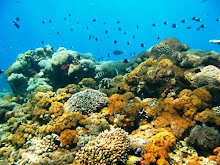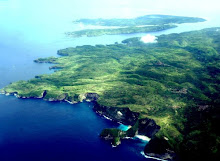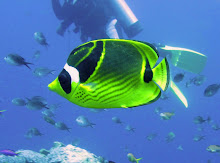Have you ever thought about how colourful aquarium fish are captured?
A common method is to use cyanide bombs to temporarily stun the fish but not kill them.
However in the process cyanide kills the coral reef doing lasting damage to the ecosystem. But on the small island of Nusa Penida off the coast of Bali, Rebecca Henschke met a local environmental hero who is educating and changing the way fisherman work.
“When I was younger, around twelve years old, I didn’t know anything about the damage of cyanide. We used to just buy cyanide. Go fishing for small tropical fish. At the same time as getting small fish they also died in an entertaining way. They leaped up into the air. As a kid I used to think that was really funny.”
Fisherman, painter and seaweed farmer, I Wayan Ujiana, also used to mine sand to build his house and regularly cut down mangrove trees. But now he sits in a room he has turned into an environmental information centre.
Posters about the islands rich biodiversity and images of sea-life drawn by his students cover the walls.
“Now I don’t think it’s funny at all. It’s was a very wrong way of thinking. Now even if you want to buy cyanide on this island it’s very hard. If I find someone selling it I go straight up to them and ask them what is this for? The next day they are usually not brave enough to sell it.”
He is a local environmental hero who is leading a grass roots movement to have 20,000hectares of the sea around Nusa Penida declared a government-backed Marine Protection area.
“With a protection area, with different zone areas for different activities, there will a legal basis for our work. At the moment we are just trying to educate people but if there is a punishment involved it will make our work easier.” The Marine Protection Area will create a no-fishing area where breeding can take place as well as an area for tourism and sea weed farming.
This month the Marine Protection Area will be dedicated by the government. It’s been a four-year-long process. “Because we think that the area needs to be protected but at the same time we need to ensure that the community can benefit from it.”
Elis Nurhayati from The Nature Conservancy (TNC), the international environmental group behind the idea, explains why it’s taken so long.
“We want this vision that conservation can come hand-in-hand with development. Because often it will fail if we come with regulation first. First we want to be aware of the benefits of a marine protection area. Once they buy into the idea then they will respect it without it having to be enforced very severely.”
Making sure that sustainability equals development means creating eco-tourism opportunities. In a wooden canoe, we glide through one-meter wide channels. Either side of us is dense mangrove forest. Below fish breed, birds nest in the trees and lizards hunt in a labyrinth of above ground roots.
We are on a mangrove forest tour.
Wayan says ten years ago these mangroves were cut down to fuel the salt plantations. Now this is a protected area where at least 20 tourists a day visit. And to keep the mangroves clean the local community now holds a clean-up once week. To make sure plastic is not stopping new shoots growing up. But tourism is also bringing great damage to the island.
Coming down to the beach you get a sense of the intense tourism that the island is now dealing with. The hillsides are stacked with bungalows. Out to sea the small harbour is full of boats offering snorkeling and dive trips. In front of me is a huge pontoon with waterslides where tourists are playing and heading off from on speed boats and paragliding.
Wira Sanjaya, the community outreach office with TNC, says the anchor below that pontoon moves and smashes the coral reef below it. There is also no waste treatment on the island; it all goes directly out to sea, Wira tries to explain to tourist operators and the government that things need to urgently change for the industry to survive.
“The people come here to see the beautiful coral reef and the healthy mangroves. And in July to September they come here to see the ocean sun fish we call the Mola-Mola. So many come here and we need to make all these activities sustainable: tourism, fishing, sea weed farming and, most of all, the environment.”
Before we leave the island we return to Wayan’s house - the teacher who used to cyanide bomb fish but is now the island’s leading environmentalist. He has two children now who have very different ideas of entertainment.
“My children are even more passionate than me. They will not even touch coral. I have raised them so they are not like what I was. I think they will replace me in leading the conservation effort. Because every time I plant mangroves or restore coral reefs I invite them even though they are small because I don’t know when I will die and they are the future.”
source : http://www.asiacalling.org/index.php?option=com_content&view=article&id=1382%3Aindonesian-fisherman-becomes-a-local-environmental-hero&catid=1%3Aindonesia&Itemid=263&lang=en
Senin, 17 Mei 2010
Kamis, 06 Mei 2010
Hari Bumi (Earth Day) 2010 Nusa Penida
Jambore Lingkungan SMP dan SMA Se-Kecamatan Nusa Penida
“ketika pohon terakhir ditebang, ketika air bersih terakhir tercemari, dan ketika ikan terakhir habis ditangkap, maka disitu kita manusia baru akan sadar bahwa ternyata uang tidak bisa dimakan”.
Hari Bumi (Earth Day) 2010 yang diperingati pada tanggal 22 April, seperti biasanya kembali dimeriahkan oleh berbagai kegiatan terkait pelestarian lingkungan di seluruh dunia. Peringatan ini bukanlah sekedar ajang seremonial belaka, namun menjadi momentum untuk terus-menerus mengingatkan kita semua umat manusia untuk menjaga alam dan lingkungan mengingat hidup kita sangat bergantung dengan alam.
Kecamatan Nusa Penida, Kabupaten Klungkung sebagai satu-satunya kecamatan kepulauan di propinsi Bali, tidak ketinggalan pula ikut merayakan peringatan Hari Bumi untuk menyebarkan pesan-pesan pelestarian lingkungan bagi masyarakat sekitar khususnya di kalangan muda. Upaya pelestarian lingkungan di Nusa Penida sangat relevan dan penting mengingat kecamatan Nusa Penida sebagai pulau-pulau kecil sangat bergantung dengan alam dan rentan terhadap ancaman perubahan iklim.
Peringatan Hari Bumi di Kecamatan Nusa Penida tahun 2010 ini dirayakan dengan mengadakan Jambore Lingkungan untuk pelajar SMP dan SMA se-Kecamatan Nusa Penida. Jambore lingkungan diadakan dari tanggal 22 – 23 April bertempat di pantai Atuh – Desa Penjukutan. Sekitar 150 peserta ikut ambil bagian dalam Jambore Lingkungan ini.
Jambore lingkungan Hari Bumi di Nusa Penida ini merupakan kerjasama antara Kecamatan Nusa Penida dengan berbagai lembaga seperti The Nature Conservancy (TNC) Nusa Penida, Yayasan Kura-Kura, Yayasan Pecinta Taman Nasional (FNPF), dan Bali Hai Cruises. Jambore lingkungan ini juga merupakan bagian dari gerakan Indonesia for Coral Day yang kegiatannya dipusatkan di pulau Serangan-Denpasar.
Berbagai aktivitas, lomba, dan presentasi dilaksanakan dan diberikan selama Jambore Lingkungan berlansung. TNC Nusa Penida yang memiliki fokus kegiatan di pesisir dan laut menyampaikan materi mengenai keanekaragaman hayati pesisir dan laut yang ada di Nusa Penida. Sementara itu Yayasan Pecinta Taman Nasional (FNPF) memberikan materi dasar-dasar konservasi dan pelestarian burung. Yayasan Kura-Kura memfokuskan presentasi mereka pada pelestarian penyu dan pengelolaan sampah. Presentasi ini juga diselingi dengan berbagai permainan, pemutaran film dan quiz.
Aneka lomba seperti malam kreatiivitas seni dengan pesan-pesan lingkungan dilaksanakan sepanjang malam jambore. Anak-anak SMP dan SMA Nusa Penida dengan percaya diri dan kreativitas yang tinggi menampilkan aneka sendratari, nyanyian, drama, dan puisi bernuansa religi. Keluar sebagai juara dalam lomba kreativitas seni ini adalah SMP 3 Nusa Penida. Malam hari juga diisi dengan kegiatan doa bersama dan perenungan.
Setelah melalui uparaca penutupan pada tanggal 23 April sore, para peserta pulang ke rumah masing-masing dengan perasaan gembira, hal ini terlihat dengan banyaknya permintaan untuk mengadakan kegiatan Jambore Lingkungan kembali tahun depan. Namun dari semuanya itu, semoga pesan-pesan konservasi alam yang didapatkan selama perkemahan dapat mereka bagikan kepada semua teman-teman, saudara dan keluarga saat mereka pulang, terlebih lagi dapat mereka amalkan dalam kegiatan mereka sehari-hari.
Salam Lestari
“ketika pohon terakhir ditebang, ketika air bersih terakhir tercemari, dan ketika ikan terakhir habis ditangkap, maka disitu kita manusia baru akan sadar bahwa ternyata uang tidak bisa dimakan”.
Hari Bumi (Earth Day) 2010 yang diperingati pada tanggal 22 April, seperti biasanya kembali dimeriahkan oleh berbagai kegiatan terkait pelestarian lingkungan di seluruh dunia. Peringatan ini bukanlah sekedar ajang seremonial belaka, namun menjadi momentum untuk terus-menerus mengingatkan kita semua umat manusia untuk menjaga alam dan lingkungan mengingat hidup kita sangat bergantung dengan alam.
Kecamatan Nusa Penida, Kabupaten Klungkung sebagai satu-satunya kecamatan kepulauan di propinsi Bali, tidak ketinggalan pula ikut merayakan peringatan Hari Bumi untuk menyebarkan pesan-pesan pelestarian lingkungan bagi masyarakat sekitar khususnya di kalangan muda. Upaya pelestarian lingkungan di Nusa Penida sangat relevan dan penting mengingat kecamatan Nusa Penida sebagai pulau-pulau kecil sangat bergantung dengan alam dan rentan terhadap ancaman perubahan iklim.
Peringatan Hari Bumi di Kecamatan Nusa Penida tahun 2010 ini dirayakan dengan mengadakan Jambore Lingkungan untuk pelajar SMP dan SMA se-Kecamatan Nusa Penida. Jambore lingkungan diadakan dari tanggal 22 – 23 April bertempat di pantai Atuh – Desa Penjukutan. Sekitar 150 peserta ikut ambil bagian dalam Jambore Lingkungan ini.
Jambore lingkungan Hari Bumi di Nusa Penida ini merupakan kerjasama antara Kecamatan Nusa Penida dengan berbagai lembaga seperti The Nature Conservancy (TNC) Nusa Penida, Yayasan Kura-Kura, Yayasan Pecinta Taman Nasional (FNPF), dan Bali Hai Cruises. Jambore lingkungan ini juga merupakan bagian dari gerakan Indonesia for Coral Day yang kegiatannya dipusatkan di pulau Serangan-Denpasar.
Berbagai aktivitas, lomba, dan presentasi dilaksanakan dan diberikan selama Jambore Lingkungan berlansung. TNC Nusa Penida yang memiliki fokus kegiatan di pesisir dan laut menyampaikan materi mengenai keanekaragaman hayati pesisir dan laut yang ada di Nusa Penida. Sementara itu Yayasan Pecinta Taman Nasional (FNPF) memberikan materi dasar-dasar konservasi dan pelestarian burung. Yayasan Kura-Kura memfokuskan presentasi mereka pada pelestarian penyu dan pengelolaan sampah. Presentasi ini juga diselingi dengan berbagai permainan, pemutaran film dan quiz.
Aneka lomba seperti malam kreatiivitas seni dengan pesan-pesan lingkungan dilaksanakan sepanjang malam jambore. Anak-anak SMP dan SMA Nusa Penida dengan percaya diri dan kreativitas yang tinggi menampilkan aneka sendratari, nyanyian, drama, dan puisi bernuansa religi. Keluar sebagai juara dalam lomba kreativitas seni ini adalah SMP 3 Nusa Penida. Malam hari juga diisi dengan kegiatan doa bersama dan perenungan.
Setelah melalui uparaca penutupan pada tanggal 23 April sore, para peserta pulang ke rumah masing-masing dengan perasaan gembira, hal ini terlihat dengan banyaknya permintaan untuk mengadakan kegiatan Jambore Lingkungan kembali tahun depan. Namun dari semuanya itu, semoga pesan-pesan konservasi alam yang didapatkan selama perkemahan dapat mereka bagikan kepada semua teman-teman, saudara dan keluarga saat mereka pulang, terlebih lagi dapat mereka amalkan dalam kegiatan mereka sehari-hari.
Salam Lestari
Langganan:
Postingan (Atom)







